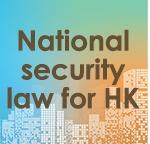 This undated photo shows Hong Kong Executive Councilor and former secretary for security Regina Ip Lau Suk-yee. (PARKER ZHENG / CHINA DAILY)
This undated photo shows Hong Kong Executive Councilor and former secretary for security Regina Ip Lau Suk-yee. (PARKER ZHENG / CHINA DAILY)
Hong Kong former security chief Regina Ip Lau Suk-yee said British National (Overseas) passport holders who opt for the United Kingdom’s citizenship are not entitled to the rights and benefits that local permanent residents have.
I think it’s really for consideration whether these people should continue to be regarded as Chinese ... These are people who will have left Hong Kong for very determined reasons ...
Regina Ip Lau Suk-yee, Hong Kong's former security chief
“I think it’s really for consideration whether these people should continue to be regarded as Chinese. Why should they continue to have the right to vote? The right to stand for elections? The right to collect our government’s handout of HK$10,000 (US$1,290), or the HK$6,000 as permanent residents? These are people who will have left Hong Kong for very determined reasons. So I think it’s a matter for consideration,” the veteran lawmaker said.
In an interview with China Daily on Friday, the executive councilor put the issue in perspective after the UK announced a route for UK citizenship to Hong Kong’s BN(O) passport holders. Under the program, which began on Sunday, the city’s BN(O) passport holders who apply will be granted five years of UK residency, followed by one year of “settled status”, after which the BN(O) passport holder can apply for citizenship.
“Because you have so determined to have left Hong Kong for six years, it means you no longer want to be part of Hong Kong,” Ip said. She suggested revoking the Hong Kong passport of BN(O) passport holders once they obtain UK citizenship.
In response, the central and the Hong Kong Special Administrative Region governments announced on Friday that BN(O) passports will not be recognized as a valid travel document and proof of identity in any form in China. As of Sunday, inbound and outbound Hong Kong passengers were required to present their HKSAR passport or permanent identity cards as proof of identity upon immigration clearance.
ALSO READ: Foreign Ministry: Nation to reject UK's BNO passport
In Ip’s opinion, China is entitled to take such countermeasures, given that the UK has breached its own undertaking in its memorandum back in 1984 amid the signing of the Sino-British Joint Declaration, which made it clear that UK citizenship will not be conferred to BN(O) passport holders.
In fact, that’s a key consideration for allowing Hong Kong residents of Chinese nationality to hold the BN(O) passports or other foreign passports, as long as they are only used as travel documents, she said.
“With the return of Hong Kong to the motherland, the UK’s responsibility ended and it has no more responsibility for Hong Kong, and it has no power to enforce the Joint Declaration or the Basic Law. It’s a matter for China. It’s a matter for Hong Kong,” she said.
Ip refuted some UK politicians’ claims that the National Security Law for Hong Kong is a reason for the UK to introduce the citizenship program.
There is nothing in the Joint Declaration that prohibits Beijing from enacting a national security law, she said.
“If there are unjustified moves to encourage Hong Kong people to leave based on bogus accusations about the national security law, I think we should take appropriate countermeasures,” Ip said.
Criticism ‘hypocrisy’
Ip also commented on the topic of “patriots governing Hong Kong”, a principle that was highlighted by President Xi Jinping when hearing a video conferencing work report by the city’s chief executive, Carrie Lam Cheng Yuet-ngor, last week.
READ MORE: Xi stresses 'patriots governing HK' when hearing Lam's report
The criticism by foreign countries on this issue and the National Security Law smacks of “double standards and hypocrisy”, Ip said
Ip said the criteria for those governing Hong Kong was long laid down by then-State leader Deng Xiaoping, architect of the “one country, two systems” principle.
The recent debate on the “patriots governing Hong Kong” principle was heightened after the National Security Law for Hong Kong required those standing for elections and those holding public office to confirm in writing or take an oath to swear allegiance to the SAR and the country. The SAR government is expected after the Lunar New Year holiday to introduce in the city’s legislature an amendment bill to make this clear.
The criticism by foreign countries on this issue and the National Security Law smacks of “double standards and hypocrisy”, Ip said.
“They have far more stringent national security laws. They have much tougher enforcement. They have strict requirements of allegiance from the public service,” she said.
“Making an appropriate declaration of allegiance is very common in many countries.”
In fact, foreign countries have similar requirements and high expectations of their citizens in terms of patriotism, she noted.
In the United States, for example, schools teach US history, US values, and the US Constitution from a very young age to cultivate a proper sense of appreciation of their country.
“So what China is doing is no different from what they are doing. The accusations are an example of double standards and hypocrisy,” she said.
gangwen@mail.chinadaily.com.cn



